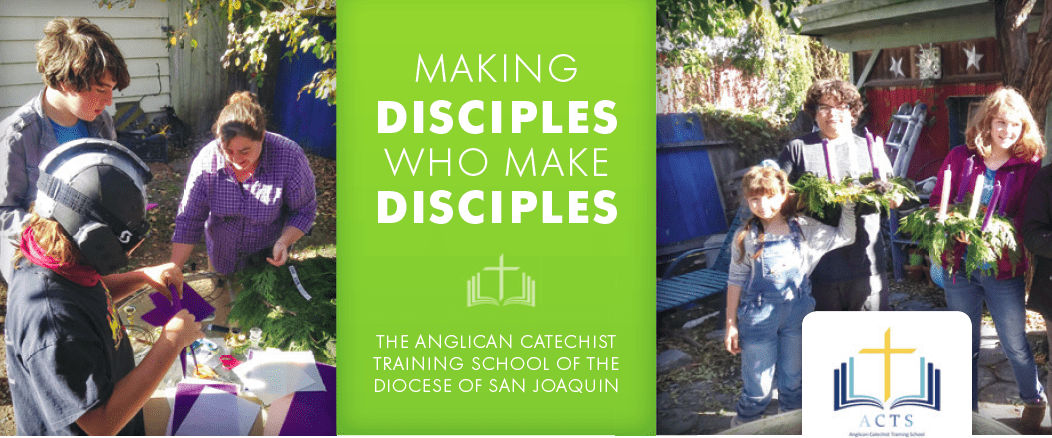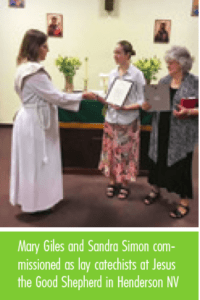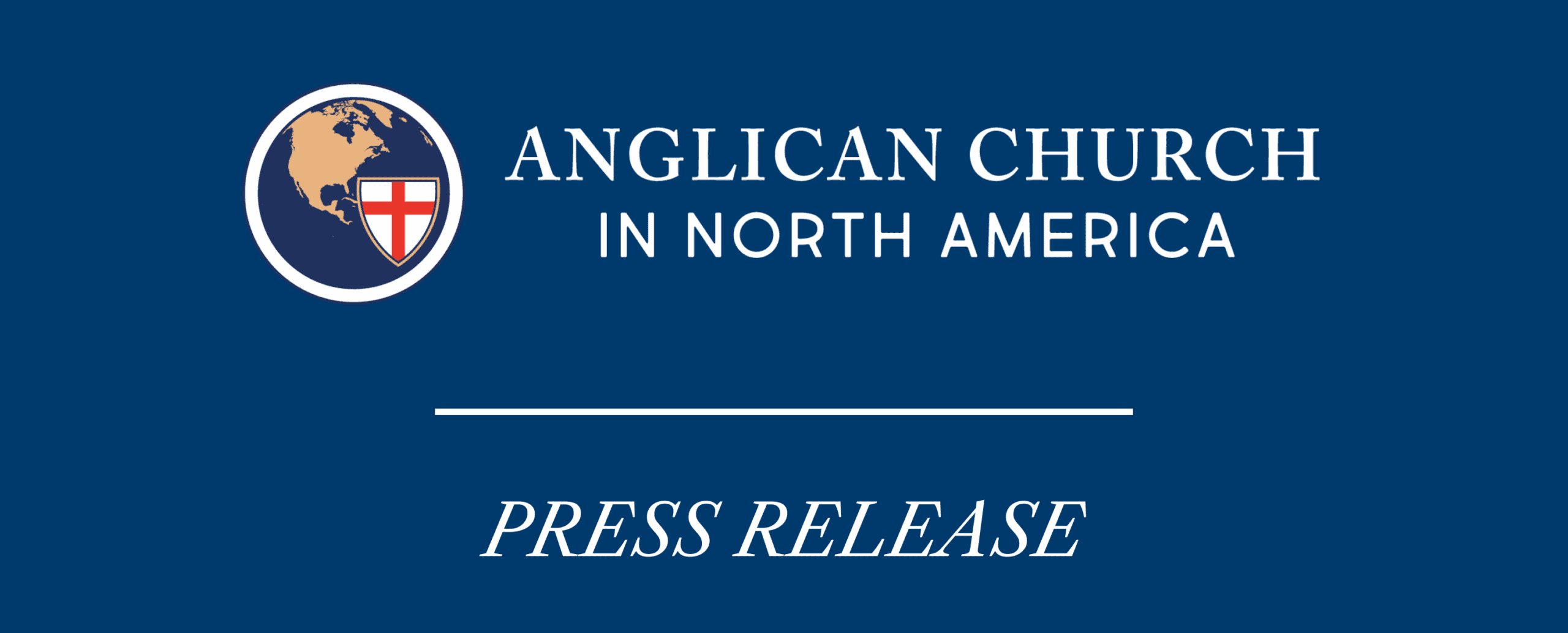By Rachel Thebeau
“We need to get back to making disciples, people who know their Bible,” said Elizabeth (Beth) Conkle, Director of the Anglican Catechist Training School (ACTS) in the Diocese of San Joaquin. “Most Americans are ignorant of doctrine. The early Church, when you look at the New Testament, they were definitely passing on doctrine to people. We’ve got to get back to that in the Church.” The ACTS program, with its purpose of “equipping lay leaders to equip the Saints,” seeks to do just that.
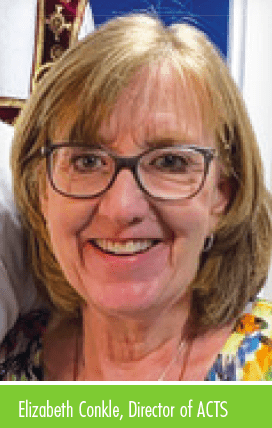
Grounded in the Gospel, the course is intensive, beginning in the middle of August and ending in May. Each month, the class covers a different topic or focus including the Trinity, prayer, and the Ten Commandments. Students are assigned a book, questions from the Catechism, and discussion questions via an online classroom where they comment on and discuss their assignments. On the first Saturday of each month, the class meets– now virtually – to discuss the month’s topic and the relevant video teaching done by diocesan clergy and lay leaders.
That’s just the classroom portion.
In addition, students are expected to meet with a clergy or lay mentor once each month and complete or design a cap- stone project by the end of the year in which they develop a catechesis-related program for their congregation. They engage in spiritual formation practices like the Daily Office, and they develop a Rule of Life.
As Beth said with a slight chuckle, “It’s a commitment!”
That it is, but at completion, graduates are licensed by the bishop as Lay Catechists and commissioned by their priest for catechist ministry. While some decide to pursue ordination, according to Beth, “most want to do lay ministry,” and the Diocese is seeing results.
“The Church is experiencing life because we’ve trained lay people,” Beth said with passion and excitement! “The congregations who are buying into [ACTS] are seeing revitalization.” In one instance, a congregation doubled in size despite Covid, in large part due to the leadership of the licensed lay catechists. The bi-vocational rector, Fr. Howard Giles, relies on his lay people, especially those who have been trained through the ACTS program. Beth explained, “There’s a lot happening because the lay people are taking it on. The lay people are helping to run the church!”
The congregation’s Lay Catechists lead catechism courses of various kinds which Beth testifies has brought people into the congregation.
Fr. Giles recognizes it’s because these leaders have been formed to make disciples. “The ACTS program’s thorough training in the catechism has given our catechists the theological competence that they need to be confident in discipling their fellow parishioners in the Gospel of Jesus Christ,” he said.
But to Beth, who developed the program, more than an understanding of doctrine is needed in the Church’s leaders; they also need to be spiritually healthy. Her own history gives her experiential knowledge of this reality.
After time in a dysfunctional and abusive church setting that wounded her deeply, a time after which she admits she could have easily lost her faith and turned against the Church, Beth’s heart was actually softened toward the Church.
“I almost left the Church at that time because I was so wounded. But I didn’t end up leaving, I ended up loving the Church more. I love the Bride of Christ, and I want to see her become all that she can be for Jesus.”
But to do so, “Leaders need to be healthy. Because of their position and their authority, people look to them like they’re looking to God almost. And you need to be healthy because you can hurt the sheep,” she said before reflecting on Ezekiel 34 and God’s rebuke of the shepherds of Israel. “I will shep- herd my sheep because you guys are feeding off of them,” she paraphrases, “well, that’s all over the United States in churches. So that’s part of where [ACTS] came out of.”
As she speaks, her passion and enthusiasm for the Church pours out. “I just love the Church. It’s His bride,” she repeated several times. After becoming an Anglican and eventually discerning whether she was called to ordination as a deacon, Beth found clarity. Her call was farther-reaching than any singular parish for which she would serve as a deacon.
“I went to see the bishop and I said to him, ‘Bishop, I’m not supposed to be a deacon, but I will be your Catechist,’” Beth, who has a Masters of Divinity, recalled. “I didn’t even know what I was saying. That week, it was like – honestly – the Holy Spirit downloaded a file in my brain, and I had all of ACTS. I had a syllabus, I wrote up an application, I wrote up a purpose – I had it. It was just in my head.”
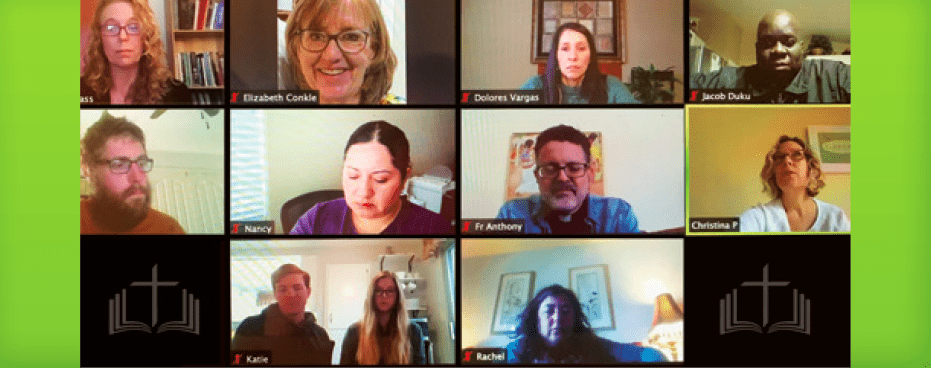
The vision statement for the program reveals the heart, passion, and purpose of the program, listing four essentials for equipping spiritual leaders:
- Sound doctrine in the basics of the faith; A spiritual formation that leads to emotional maturity; 3. An ability to walk closely/abide with Christ and learn from Him, letting him prune us, correct us, and heal us. 4. A growing faith to step out and trust God when he leads in ministry.
Students develop sound theology, strengthen their spirit, and learn by doing. Then, they are released and mobilized into ministry.
As current ACTS student Rachel Conrrique said, “The ACTS class has been a rich and formative experience for me. There were faith strengthening opportunities integrated throughout the class gatherings, readings, and practical assignments. The goal here is to know Christ more, to be conformed into His image by the power of the Triune God, and to be equipped to teach others. I especially loved the prayer practices and invitations and am now inspired to attend a Spiritual Direction Program in the fall.”
“Start small and pray”
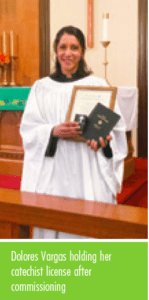
Making disciples to make disciples – that’s the heart of Beth Conkle and the Lord’s call for his Church. It’s the purpose of the Anglican Catechist Training School, and, in Beth’s opinion, “any diocese can do [a program like ACTS]. Start small and pray,” she said.
She’s also willing to share her curriculum. “God gave me this so anybody can have it. It’s not mine, it’s God’s,” she stated.
If you’re interested in connecting with Beth for more information on ACTS or how to begin a catechist training program in your diocese, visit https://anglicancatechist.org/contact-us.

